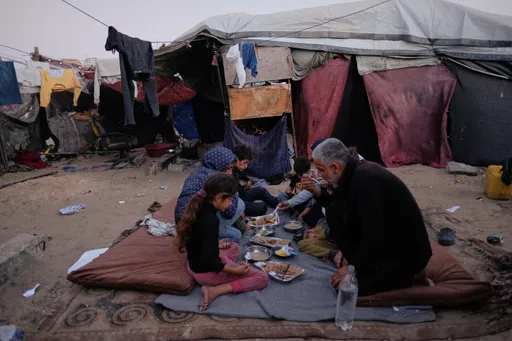STOCKHOLM — He was described by Arab sports journalists as “A giant of the golden age of Syrian football”, the bright-eyed young goalkeeper from Qamishli, a city in North-Eastern Syria, sports a bristly 80s moustache and grins broadly in the faded photos of him among his teammates on the national team, except in images of him at play on the field where he flies in mid-air, eyes alert and arms outstretched to catch the ball. He had competed with the national team twice in the Asia cup. He emigrated to Sweden with his family in 1990.
“Everyone in our area called him Josef 'El Batal' the hero,” recounts his daughter Mirrey Gourie, 31, the pride obvious in her voice.
Her voice breaks slightly: “It’s still hard to believe that someone so strong, who was so strong his entire life could die like that, I’m still in shock.”
It's been little over a week since Mirrey, her mother, sister and brother bade her 64-year-old father Josef Gourie farewell after he contracted Covid-19. He was hospitalised in St.Goran hospital in the North of Stockholm for five days before succumbing to the infection. Doctors at the hospital had judged it too dangerous for him to be put on a respirator but it was hoped that the otherwise healthy man could heal through oxygen therapy.
The Gourie family lives in Spanga, a northern suburb in the Swedish capital and one of the areas hit hardest by the coronavirus crisis. The latest figures from Region Stockholm show that there are 47 cases per 10,000 and 37 cases per 10,000 respectively in Spanga-Tensta and Rinkeby-Kista, another suburban area. The numbers are far above the average of 13 coronavirus infections for every 10,000 people living in the Stockholm region. They are both working-class immigrant majority areas that the local press sometimes sensationalised as “no go zones”.
Sweden has been headlining in the international media for its outlier approach to dealing with the global coronavirus pandemic. While Europe goes into lockdown, Sweden’s strategy based on slowing transmission and shielding the elderly to remain within the health system capacity, but not to explicitly try and prevent transmission. So far, 11,445 cases have been recorded, and 1,033 people have died in a population of 10 million.
The Swedish government has not yet released statistics on those who have died but over the past weeks there has been increasing evidence that ethnic minorities are disproportionately affected. This was first discovered in late March in the same hospital in which Josef Gourie had died, St Goran. Doctors told the press that there was an “overrepresentation” of coronavirus patients from the northern suburbs. The Swedish Somali doctors association then revealed that at least six out of 15 fatalities that occurred in Stockholm on March 24 were of Somali origin.
It is unclear when Joseph Gurie was infected but the family suspects at a church service in the Syriac Orthodox Church of St. Petrus in Hallonbergen on March 15. After several illnesses and deaths among parishioners as a result of the coronavirus, the church has closed until further notice. Among those who have also been affected is Nuri Kino a Swedish-Syriac investigative journalist, whose research shows that the Assyrian and Syriac communities count at least 46 dead from a population of about 150,000. And among them his own family.
“I have two uncles, an aunt and a cousin in hospitals. Five of my friends have lost loved ones. Many other people I knew have passed away,” he said
Kino believes there are clear reasons why ethnic minorities suffer more. “There are differences between how immigrant communities and other Swedes socialise. For example, there can be at least 500 people at a wedding or a funeral. We also have churches with 800 or more attendees, associations and clubs where hundreds of people meet on a daily basis. The Swedish coronavirus strategy is probably not adjusted for this kind of behaviour.”
Mirrey Gourie angrily asked: “Why has Sweden not introduced laws to protect the people as other countries have done? When my dad got infected at the church he was following the law, it was still ok to be in gatherings of more than 500. If they had locked down earlier maybe he wouldn’t have died. We get accused of being irresponsible when the people in the rich part of Stockholm still go out to outdoor bars.”
Sweden quite recently reduced gatherings to 50 people while schools, restaurants and shops remain open.
Dr Carina King, an epidemiologist at the Karolinska institute believes that the virus hits disadvantaged communities harder. “As we’ve seen in other settings, this infection is not an equaliser. It has impacted socio-economic groups differently, and it is likely the same will be true here,” she said.
Gourie thinks this is true of Spanga. “I think it's affected us because people live so close and -people don't have a high income, they don’t have the money to go to a hotel to isolate yourself from their family. People continue to go out to work because they can’t afford not to.”
Authorities believe that another major reason was that the guidelines were not published in minority languages and swiftly rectified it, publishing guidelines for social distancing and hygiene in multiple languages.
“I don’t believe the biggest problem was that people were ignorant. Corona was all my patients talked about since late February. Many of them were more concerned than me and took this matter seriously even earlier than I did,” said Dr Roya Hakmina a doctor working in the suburbs
“I would say that the neoliberal development in health care has disadvantaged poorer areas. There is scientific evidence for example that health care centres [Vardcentraler] are more established in richer areas and just by Googling you see that there is an accumulation of clinics in more affluent areas. And the Stockholm region authorities don’t give the resources needed to areas with more sickness or special needs,” she explained.
Mirrey Gourie believes her father did not get the treatment he needed initially as when he first went to a primary care hospital exhibiting clear symptoms of the virus he was told that the hospital did not have enough resources to give him a Covid-19 test and sent him home with antibiotics and instructions to wait. His symptoms got worse and Mirrey called the emergency services. Less than a week later he was dead. To this day Mirrey and the rest of her family have not been tested for the virus.
“My dad loved Sweden so much and I could see in his eyes as he lay in the hospital bed that he knew that the system had failed him, I will take that look with me to the end of my days,” she said.























